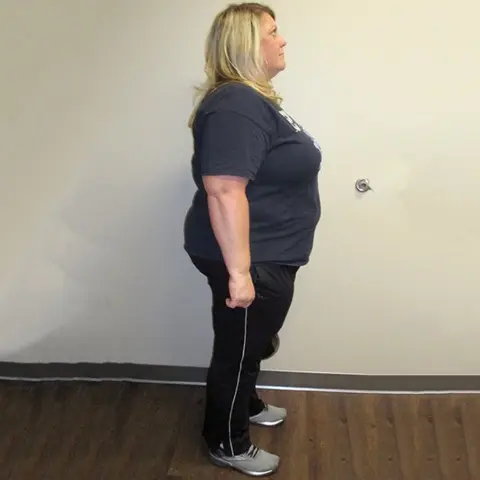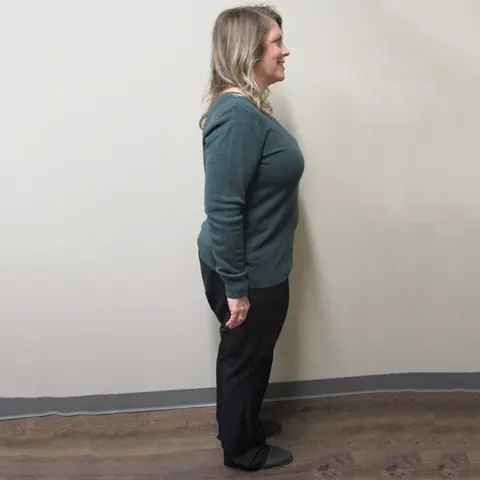

Gastric Sleeve surgery, also known as sleeve gastrectomy, is a low-invasive surgical weight-loss procedure that involves removing a large portion of the stomach. The surgery reduces about 80% of the size of the stomach, creating a "sleeve" or a “banana” structure.
The procedure works by limiting the amount of food the stomach can hold, leading to reduced calorie intake and, ultimately, weight loss. It is reposted that the amount of food intake of normal humans of 4 to 6 cups will be decreased by 2 to 3 oz.
The surgery also impacts the appetite-regulating hormone called ‘ghrelin’ commonly referred to as the “hunger hormone” and affects hunger, satiety, and blood sugar control. It's a permanent procedure and can't be reversed.
However, it's essential to note that while gastric sleeve surgery can aid weight loss, it's not a quick fix. Patients must commit to healthy eating and regular exercise post-surgery for the procedure to be effective long-term.
Weight loss varies widely among individuals after gastric sleeve surgery, and it is influenced by factors like the patient's starting weight, overall health, age, sex, and adherence to lifestyle changes post-surgery. However, on average, patients can expect to lose about 60-70% of their excess body weight within the first year after the surgery.
For example, if a patient is 100 pounds overweight (meaning they have 100 pounds to lose to reach a healthy weight), they might expect to lose around 60 to 70 pounds over the course of 1-2 years. But it's important to remember that these are averages and individual results can vary.
It's also crucial to understand that gastric sleeve surgery is not a cure for obesity on its own. Rather, it's a powerful tool that, along with dietary changes, physical activity, and lifestyle modifications, can significantly aid in weight loss and help maintain it in the long run.
Gastric sleeve surgery may indeed be considered for individuals with a BMI of 30 to 35 who also suffer from serious weight-related health problems like type 2 diabetes, high blood pressure, or sleep apnea. This is under the recognition that these conditions can significantly improve or even resolve with weight loss.
For individuals with a BMI over 35, gastric sleeve surgery can be a particularly strong consideration, even more so if they suffer from similar obesity-related health conditions. The decision should always be made in conjunction with a qualified healthcare professional who can evaluate the patient's overall health status, the severity of their obesity, their readiness to commit to lifestyle changes, and the potential risks and benefits of the procedure.
Pros of Gastric Sleeve Surgery:
- Significant Weight Loss: Gastric sleeve surgery can result in substantial weight loss, often losing a large percentage of excess body weight within a relatively short period of time.
- Decreased Hunger: Most patients report feeling less hungry after the procedure because the portion of the stomach responsible for stimulating hunger (the fundus) is removed.
- Improvement in Comorbid Conditions: Conditions associated with obesity, such as type 2 diabetes, high blood pressure, sleep apnea, joint pain, and heart disease, can improve or even resolve after the surgery.
- Shorter Recovery Time: Compared to more complex surgeries like gastric bypass, the recovery time is usually shorter for gastric sleeve surgery.
- No Foreign Objects: Unlike gastric banding, there are no foreign objects placed inside the body during sleeve gastrectomy.
Cons of Gastric Sleeve Surgery:
- Surgical Risks and Complications: As with any surgical procedure, gastric sleeve surgery carries the risk of complications, such as infection, blood clots, or hemorrhage.
- Irreversible: Unlike some forms of bariatric surgery, such as the gastric band, the gastric sleeve is irreversible. Once the stomach is removed, it can't be restored to its original size.
- Potential for Excess Skin: The significant weight loss resulting from this procedure can lead to excess skin, which may require further surgeries to remove if it becomes problematic.
- Possible Worsening of Acid Reflux: In some patients, gastric sleeve surgery might worsen acid reflux. Individuals with severe reflux may be recommended to consider other weight loss surgeries.
- Anesthesia Risks: As the surgery requires general anesthesia, there are associated risks, including allergic reactions or breathing difficulties.
Keep in mind that this is a general overview and individual experiences can vary. It's important to have a thorough discussion with a healthcare professional who can provide personalized advice considering individual health history and current medical conditions.
Before undergoing gastric sleeve surgery, there are several steps you should take to prepare:
- Follow Pre-Op Diet: This diet will help to shrink your liver, making the surgery easier and safer. Your healthcare provider will usually give you a specific diet to follow, often high in protein and low in carbohydrates.
- Hydration: Staying hydrated before your surgery is important. Drink plenty of water and avoid drinks high in sugar and caffeine.
- Stop Smoking: If you're a smoker, you'll need to stop 3-4 weeks prior to surgery, as smoking can increase the risk of complications and slow down the healing process.
- Review Medications with Your Doctor: Some medications may need to be adjusted or stopped prior to surgery. Be sure to review all of your current medications with your doctor, including prescription drugs, over-the-counter medications, and supplements.
- Physical Activity: Regular exercise can help your body prepare for surgery and the recovery period. Even just walking for 30 minutes a day can be beneficial.
- Limit or Avoid Alcohol: Excessive alcohol can cause dehydration and can interfere with your body's ability to recover from surgery.
- Plan for Recovery: Make arrangements for help post-surgery. This could include setting up a recovery area at home, arranging for a friend or relative to help you out for a few days after surgery, and prepping with easy-to-prepare meals and drinks.
- Mental Preparation: Prepare yourself mentally for the significant lifestyle changes ahead. Some patients find it helpful to speak with a counselor or therapist or join a support group.
- Fasting: Typically, you'll be asked to not eat or drink anything (fast) from midnight the night before your surgery.
The procedure is typically done laparoscopically, meaning it's minimally invasive. The steps for the surgery generally include:
1. Anesthesia: First, you will be put under general anesthesia. This means you'll be asleep and won't feel anything during the surgery.
2. Incisions: The surgeon will make a few small incisions in your abdomen.
3. Insertion of Laparoscope and Instruments: Through these incisions, the surgeon will insert a laparoscope (a long, thin tube with a high-intensity light and a high-resolution camera at the front) and other surgical instruments. The camera will send images to a screen, allowing the surgeon to see inside your abdomen and guide the instruments.
4. Removal of Part of the Stomach: The surgeon will remove about 80% of your stomach. What remains of your stomach is a narrow tube or sleeve, which connects to the intestines.
5. Closing the Incisions: Finally, the surgeon will remove the laparoscope and the instruments, then close the incisions.
It's important to note that while gastric sleeve surgery can significantly aid in weight loss, it should be coupled with a commitment to a healthy diet and regular exercise to maintain long-term weight loss and overall health.
Recovery from gastric sleeve surgery involves several stages and varies from person to person based on individual health factors and the body's healing process. Here's a general overview of what you might expect:
Immediately After Surgery:
- You'll likely stay in the hospital for up to 2-3 days after surgery.
- Pain is expected, but your healthcare team will manage it with medications.
- You'll begin a liquid diet, typically starting with sips of water.
The First Few Weeks:
- You'll continue with a liquid diet for a few weeks, slowly transitioning to pureed food, then soft food, before finally returning to solid food about a month after surgery. Your healthcare provider will give you specific dietary guidelines to follow.
- It's crucial to stay hydrated but avoid drinking during meals to prevent discomfort and stretching of the new, smaller stomach.
- You may feel fatigued or experience mood changes as your body adjusts.
Over the Next Few Months:
- Regular follow-up appointments with your healthcare provider are crucial to monitor your recovery, nutrition, and weight loss, and to address any concerns or complications.
- You'll gradually be able to increase your activity levels. Regular exercise is an important part of maintaining weight loss.
- Dietary changes continue to play a vital role. Eating small, balanced meals and avoiding high-sugar and high-fat foods is recommended.
- Weight loss should be consistent during this period. Rapid weight loss might lead to temporary side effects such as body aches, fatigue, dry skin, hair thinning, and feeling cold.
- You may require new clothes as your size decreases and may also notice changes in your body shape and skin elasticity.
Long-Term Recovery:
- Gastric sleeve surgery can lead to significant weight loss over 12-18 months, with many patients losing 60-70% of their excess weight.
- Long-term success involves a commitment to a healthy lifestyle, including regular exercise and a balanced diet.
- Regular medical follow-up is necessary to monitor your nutritional status and mental health and to help manage any long-term complications or challenges.
- Some patients may require additional surgeries for removing excess skin or for other reasons.
Remember, recovery varies greatly among individuals, and these are general expectations. Your healthcare team will provide the most accurate recovery plan based on your individual health status and the specifics of your surgery.
Turkey has become a popular destination for medical tourism due to the high-quality healthcare services offered at considerably lower prices compared to many Western countries. It has well-equipped hospitals, and experienced doctors, and is known for providing excellent patient care. The cost of medical procedures in Turkey is significantly lower, largely because of lower living costs, which translate into lower labor costs, and thus more affordable healthcare services.
As a percentage comparison, the cost of gastric sleeve surgery in Turkey can be up to 70-80% cheaper than in the United States or Western Europe.
In the United States, the average cost of gastric sleeve surgery is around $20,000. And In Western Europe, the average cost of gastric sleeve surgery is around €15,000. While In Turkey, the average cost of gastric sleeve surgery will be around $5,000.
Choosing Elara medical tourism agency for your gastric sleeve surgery in Turkey can provide several benefits:
1. Expert Guidance: We at Elara have an experienced team that can guide you through the entire process, ensuring it is as smooth and stress-free as possible. Our in-depth knowledge of local medical procedures, standards, and facilities is an invaluable asset to our clients.
2. Quality Care: At Elara, we partner exclusively with accredited hospitals and experienced surgeons. This allows us to guarantee that you will receive the highest standard of care.
3. Affordability: Being based in Turkey, we are well-positioned to offer cost-effective solutions without compromising on the quality of care, making it possible for you to access affordable healthcare services.
4. End-to-End Service: We manage all aspects of your medical tourism journey. From arranging the initial consultation and booking the procedure to organizing your stay and ensuring follow-up care, we handle all the details, saving you time and effort.
5. Personalized Care: Our services are tailored to each individual's needs. This ensures that you receive care best suited to your unique health requirements.
6. Convenience: With our services available in Istanbul, Izmir, and Antalya, you have the freedom to choose a location that is both convenient and appealing to you.
At Elara, we prioritize your well-being and strive to ensure that your medical tourism experience in Turkey is comfortable, safe, and successful.


Gastric Sleeve Before and After Achievements


Gastric Sleeve Before and After Brilliance


Before and After the Transformation Effect


Gastric Transformation Before and After


Weight Loss Wonders: Gastric Sleeve Before and After Impressions


Sleeve Elegance


Beyond the Sleeve




